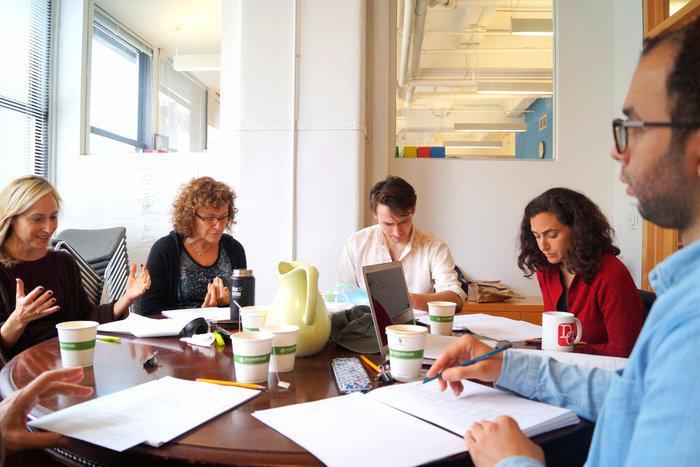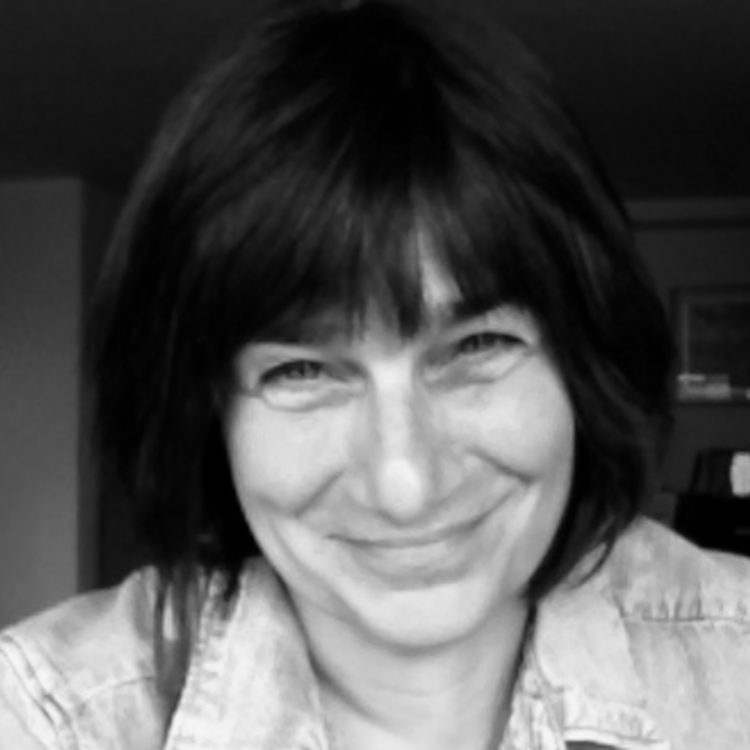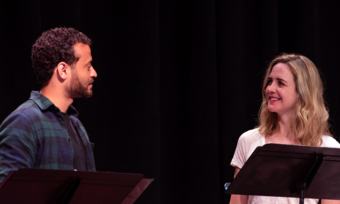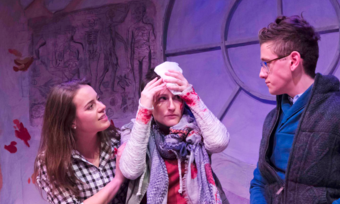Middle East America Convening, May 18–19, 2016, at The Lark

Since 2006, I have had the great privilege of creating opportunities for playwrights from all over the world to introduce their work to New York audiences. Playwrights from Africa, the Middle East, Europe, and the Americas have joined with New York actors and directors—first at the NYU Tisch School of the Arts, and more recently, at The Lark—to present new plays, often in translation, in a program called hotINK. hotINK readings have featured brilliant actors such as Kathleen Chalfant, Tina Benko, Michael Cerveris, Mia Katigbak, and Jay O. Sanders. Many outstanding directors such as Lisa Peterson, Ian Morgan, Daniella Topol, Tea Alagić, and José Zayas, worked with writers from Ireland, France, Canada, India, Singapore, Israel, Syria, and Romania to bring those stories to life. And for me, the most exciting aspect of those exchanges has been the way in which the artists have built on the initial experience and continued to correspond and collaborate through reciprocal exchanges, translation of each other’s work, and, in a few cases, creating residencies for former hotINK artists here and abroad.
In part because of those many happy and challenging experiences, I have been spending part of each year in the Middle East since 2011. I have come to focus largely on that region, and on the playwrights I’ve met there, as well as on theatre artists in the US who, like me, are of Middle Eastern heritage. I can hardly express the enjoyment and satisfaction of being together with women who make theatre in the Middle Eastern and North African (MENA) region, and US theatremakers of Middle Eastern origin—who are passionate about the cultures we come from. I convened a gathering in 2014 called “In the Same Room: Middle Eastern Women in Theater at the NYU Abu Dhabi Institute in Washington Square.” Artists and scholars from Egypt, Tunisia, Palestine, Lebanon, Syria, Turkey, and Iraq were astonished and delighted to know that we in the US Middle Eastern “diaspora” were eager to learn from and collaborate with our artistic counterparts in the countries whence our parents and grandparents had emigrated.
As part of hotINK at the Lark last spring, we brought two outstanding young playwrights to New York: Abdullah Alkafri from Syria and Amahl Khouri from Jordan, both of whom are based in Beirut. These dramatists, whose styles are so very different, tell stories that we in the West seldom hear. One play centers on the societal limitations and loneliness a single woman faces as she approaches middle age in Damascus, while the other depicts the testimonies of transgender and gay men and women in the Arab world. In other words, these pieces did not portray the sectarianism and violence that dominates our media exposure to that region, but instead capture a glimpse of deeply human, universal experiences. Based on last year’s hotINK residencies and my ongoing research and outreach in the MENA region, Artistic Director John Eisner and Managing Director Michael Robertson of The Lark asked me to oversee a Middle East-US Playwright Exchange, building on the relationships I’d begun with playwrights in that part of the world, in the context of The Lark’s remarkable approach to play translation and play development.
Several years ago, The Lark hosted a meeting of about fifteen to twenty artists of Middle Eastern origin for an afternoon of conversation about our aspirations and the challenges we faced in a post-9/11 world. The conversation was facilitated by Torange Yeghiazarian, the pioneering artistic director of the Golden Thread Productions in San Francisco, whose mission is putting Middle Eastern work “center stage.” It was to be the first of several such conversations that later included Jamil Khoury, the founding artistic director of Silk Road Rising in Chicago; and Maha Chehlaoui and Lameece Issaq, founders of the Noor Theatre. In addition, many other artists and artistic leaders in the Middle Eastern-American community, including playwrights, actors, and directors Yussef El Guindi, Mona Mansour, Leila Buck, Najla Said, Ken Kaissar, Zohar Tirosh, Denmo Ibrahim, and Nastaran Ahmadi weighed in. These conversations led to an exciting opportunity for writers: the Middle East America Playwright Fellowship, a commission funded and awarded by The Lark, Golden Thread, and Silk Road, which has so far been given to three playwrights: Adriana Sevahn-Nichols (2009), Yussef el Guindi (2012), and Mona Mansour (2014.)
In moving forward with the new Middle East-US Playwright Exchange initiative, I felt it made the most sense to gather the MENA community once again, celebrate the enormous successes of our colleagues, address some of the challenges we encounter, and tap the collective wisdom regarding future exchange with the MENA region. For example, I want to know how my Middle East American colleagues would prioritize exchanges with artists from abroad. What have been the rewards? And what should be the next steps with regard to the Middle East America Fellowship? I also want to hear “reports from the field”—what are our partners in pursuit of expanding the global theatre conversation up to? How can we help to shape a new project, initiated by Jamil Khoury and Michael Najjar, a full-out conference on Arab-American Theater in 2017?
With these questions in mind, the 2016 Middle East America Convening includes panels with many of the artists and leaders mentioned above, along with artist-led companies such as Rising Circle Theatre Collective, Hybrid TheatreWorks, and Polybe+Seats, in addition to our partners at the Sundance Institute MENA Playwrights Lab in Marrakech, whom we’ll Skype in for a panel discussion on May 18.
What does it mean to be Middle Eastern American? How can the term be defined and to whom does it refer?
At my invitation, a number of MENA artists-stakeholders sent me suggestions of topics for breakout conversations during the convening, and their ideas raise important areas of concern, such as:
- What does it mean to be Middle Eastern American? How can the term be defined and to whom does it refer?
- When casting Middle Eastern roles, what is the process for Middle Eastern actors in US theatre, film, and television?
- Is there economic censorship of “radical” Arab-American voices in the US theater? How can we address this?
- What is our connection to our respective homelands/cultures of origin?
- Preaching to the converted: how do we make our voices heard in the wider community?
- Why are there expectations of Middle Eastern American theatre to be political/focused on the conflicts/headlines?
- How can we better encourage producers and artistic directors to give more opportunities to Middle Eastern American playwrights?
- How do we find the balance between artistic freedom and the responsibilities of representing mis- and underrepresented groups such as those from the Middle East?
At the heart of a gathering of these artists is their work.
At the heart of a gathering of these artists is their work. Throughout the two days of the convening, panels, breakout conversations, and lunch and coffee breaks will alternate with readings of excerpts from new work by the current Middle Eastern America Fellow Mona Mansour. The readings also feature work from the writers who received “Honorable Mention” in the last fellowship selection process: Bianca Bagatourian, Ismail Khalidi, Misha Shulman, Daria Polatin, and Zohar Tirosh-Polk.
And next up for me is a festival I’m producing, which is not in the US but “over there.” I’m producing a series of new works by Arab and Arab-American playwrights called Arab Voices: here/there/then/now at the beautiful, new NYU Abu Dhabi Arts Center. The plays are by writers from US, Egypt, Lebanon, and Palestine; they will be performed in their original languages (with translations projected in surtitles). Most of them have a common theme: leaving one’s country, by choice or by necessity, for a new culture, and the pain of trying to go home again.









Comments
The article is just the start of the conversation—we want to know what you think about this subject, too! HowlRound is a space for knowledge-sharing, and we welcome spirited, thoughtful, and on-topic dialogue. Find our full comments policy here
Please tell me how one can get involved in some of these events? I am an actor, writer, and director of Syrian descent and would love to know how to get on the radar of some of these gatherings. I have a new solo play that I am eager to share. What you are doing is so valuable. Thank you.
Thank you so much for reaching out! For getting involved with The Lark, please join our mailing list (http://www.larktheatre.org/... and check an interest in ticketing and announcements and artistic calls for submission. Also, if you happen to be at the Theatre Communications Conference (http://www.tcg.org/events/c... in Washington, DC in June, look out for the Arab, Middle Eastern, and Muslim American Affinity Group session on Thursday, June 23 from 3:00pm - 4:30pm.
What an inspiring group of people and passions. Looking forward to the resulting conversations and next iteration of this convening with great anticipation. Thank you for making this happen.
It was such an extraordinary gathering! Thank you Catherine.